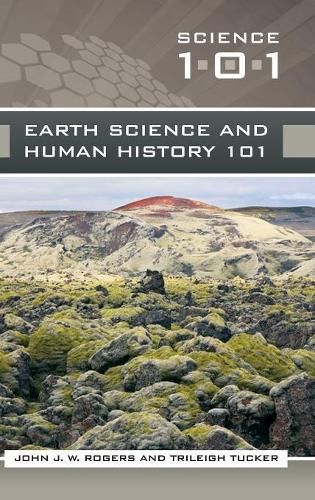
Earth Science and Human History 101
(Hardback)
Available Formats
Publishing Details
Earth Science and Human History 101
By (Author) John J.W. Rogers
By (author) John J.W. Rogers
By (author) Trileigh
By (author) Trileigh
Bloomsbury Publishing PLC
Greenwood Press
30th August 2008
United States
Classifications
Tertiary Education
Non Fiction
General and world history
304.2
Physical Properties
Hardback
208
Description
How much has human history been influenced by the earth and its processes This volume in the Science 101 series describes how both slow changes and rapid, violent, ones have impacted the development of civilizations throughout history. Slow changes include variations in climate, progressive development of types of tools and sources of energy, and changes in the types of food that people consume. Violent changes include volcanic eruptions such as the one at Toba 75,000 years ago, which may have caused diversification of people into different races, and the eruption of Santorini in 1640 BC, which may have destroyed Minoan civilization. Other disasters are Hurricane Katrina in 2005 and the tsunami in the Indian Ocean in 2004.
Reviews
The writing flows smoothly, and the information is clearly worded with many elucidatory examples that teachers will be able to use to support content. The New Orleans flood, the San Francisco earthquake, and Lewis and Clark's expedition all provide a rich context in which to bring the message home. There are many line drawings and black-and-white photos to illustrate the pages of this unique treatment. It's appropriate for research, teacher background reading, or casual reading by students with a special interest in the topic. * National Science Teachers Association *
Author Bio
John J.W. Rogers is the W.R. Kenan, Jr., Professor in Geology at the University of North Carolina. He completed his PhD work at Caltech in 1954 and was hired as one of three faculty to staff the new Geology Department at Rice University. He has conducted research in the western United States, the Caribbean, North Africa, the Middle East, and India. He is a Fellow and Past President of the International Division of the Geological Society of America, a Fellow of the Geological Society of India, and an Honorary Fellow of the Geological Society of Africa. Rogers is the author, co-author, editor, or co-editor of seven previous books. Trileigh Tucker is associate professor and director of the Environmental Studies Program at Seattle University. She earned her PhD in Geology at the University of North Carolina at Chapel Hill, with emphasis on Precambrian geochemistry. Her research interests and publications focus on phenomenology of science, particularly in the realms of science and religion, natural history, and sustainability as they connect science and humanities.
